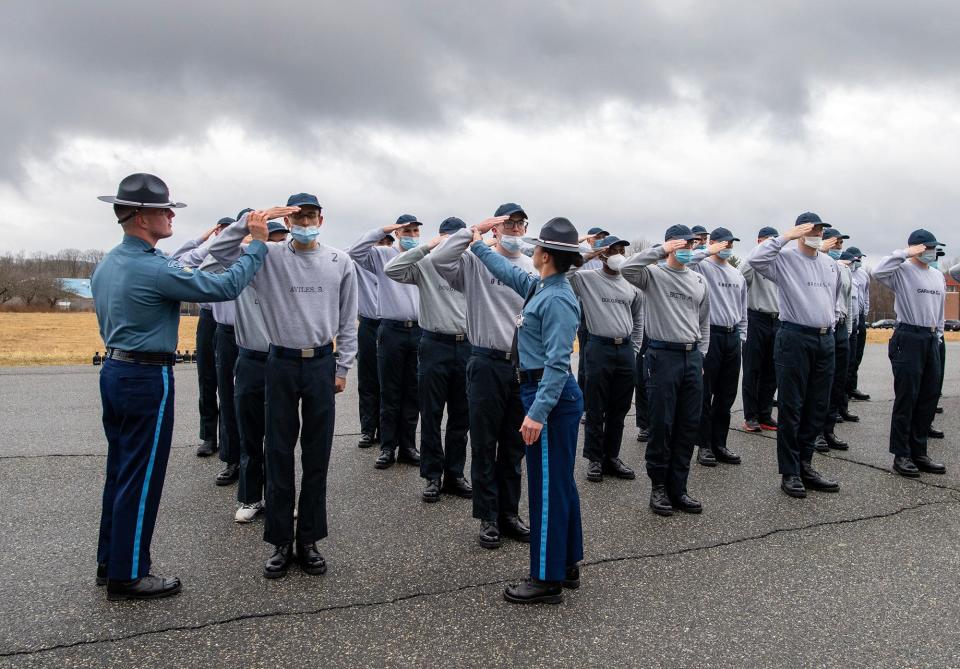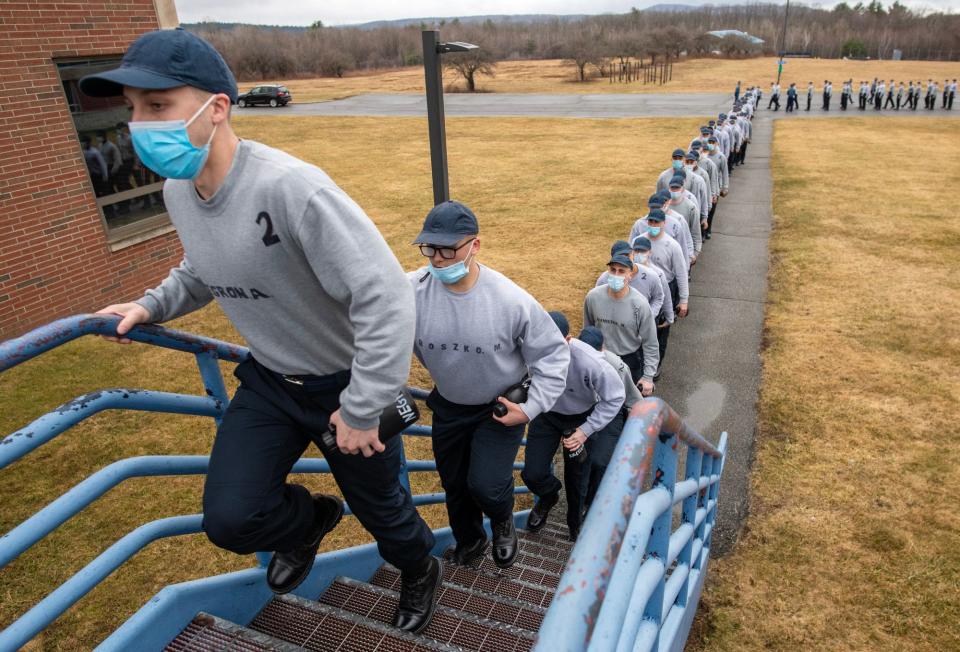Lawmakers tour State Police Academy in New Braintree, tout recruitment funding
- Oops!Something went wrong.Please try again later.
NEW BRAINTREE — Massachusetts State Police officials led a group of state legislators and Healey-Driscoll administration officials on a tour of the Massachusetts State Police Academy to highlight the methods used to train recruits and explain how funding from the administration’s budget proposal could aid recruitment and diversity.

The officials were given a demonstration of the physical training recruits must perform and met with the state’s first cadet class.
State Rep. Carlos González of Springfield, the co-chair of the Committee on Public Safety and Homeland Security, said the committee will never advocate cutting funding for public safety and that legislative leadership is supportive of the cadet program and funding to help state police diversify its ranks.
State Rep. Donald R. Berthiaume Jr. of Spencer, who represents New Braintree, said the facility is nationally recognized.
“This is the elite police training place in the nation,” Berthiaume said. “Some of the things I’ve seen here are unparalleled. I’ve seen many different police departments, other academies. I’ve been in the military. This place is first-class, top-notch, second to none.”
State police are working to build their ranks as police agencies nationwide deal with recruitment and retention issues. Public Safety and Security Secretary Terrence Reidy said he is hearing that heads of local departments are saying it is not easy to get suitable candidates.
“I think everybody in this room wants good, strong, professional police officers and I think that’s what we have and a few bad apples can really destroy that momentum,” Reidy said. “At the end of the day, when you look at the numbers and talk to our friends at the local side, it’s really hard getting quality people who want to become police officers.”

State Rep. Orlando Ramos of Springfield asked if there was any legislation that hindered state police from recruiting in the way they would like.
Eager to improve recruitment
Interim Col. John Mawn Jr., who heads the state police, said the agency is looking to explore any remedy to improve recruitment and added that the lawmakers’ presence helped state police feel support from the state Legislature.
“When it comes to trying to recruit diverse candidates, the best thing for us really is that when you are supportive, your community knows you’re supportive,” Mawn said. “And that makes this job more attractive than it might otherwise be.”
One of the state police’s strengths in recruitment is the variety of experiences it can pitch to prospective recruits, Mawn said, such as driving a boat, being a part of a K-9 unit or flying a helicopter.
The academy's drill staff also spoke to officials about the methods used to prepare recruits to become state troopers and identify the recruits who are suited for the role.
Staff said the recruits are still in the earlier phases of training where they are taught to analyze the situations they are placed in. Staff will later start to grant them more opportunities to feel accomplished in their training.
Staff explained that recruits are directly exposed to high levels of stress in a controlled environment to get the recruits to understand that stressors will exist while on the job, but their duties as troopers will never go away.
Training for recruits is structured around the concept of the POP-DOC Loop, a tool to develop accurate situational awareness in crisis respondents and deal with the stressors that come with being in unpredictable situations.
Deescalation first interaction
When asked how the academy trains recruits to handle high-pressure interactions with the public, Lt. Matthew Simpson said deescalation has always been the first line of interaction the state police have taught to handle such situations and recruits receive specific training on talking to people in those interactions.
"I have never met a police officer in almost 20 years of doing this who leaves their house and goes, 'I want to get out and get in a use-of-force incident today.' That just doesn't happen," Simpson said.
Recruits also receive blocks of training on interactions with different populations such as people with autism, people in crisis and people who are homeless.
The Healey administration’s fiscal 2024 budget invests over $12 million to recruitment efforts, with over $10 million for the next recruit training troop and $2 million for the second cadet class.
The budget provides for a new recruit training troop of 175 members.
The cadet program, which began in November 2022 and was created by the 2020 police reform bill signed into law by Gov. Charlie Baker, is an on-the-job training program that can create an alternative path to appointment to a recruit training troop after cadets complete the program and pass the civil service exam.
The inaugural class includes 47 cadets, according to state police. In the class, 53% are people of color and 27% are women. After they completed a month-long training program, the cadets work at barracks across the state.
The officials were introduced to the 88th recruit training troop. The troop has 172 recruits who were on their fifth week of a 23-week training program.
Massachusetts State Police have added 601 troopers in the past three years through the three previous recruit training troops.
According to state police, 23% of the new troopers in recent years come from underrepresented backgrounds compared to about 10% of troopers who were recruited during the previous 11 years.
This article originally appeared on Telegram & Gazette: Massachusetts Lawmakers tour State Police Academy in New Braintree

